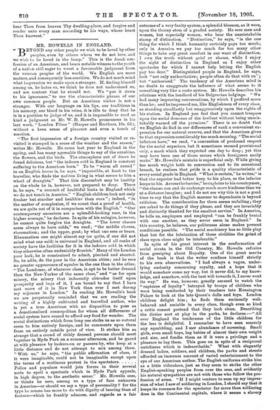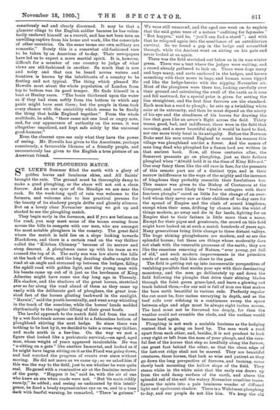" The first impression of a foreign country visited or
re- visited is stamped in a sense of the weather and the season," writes Mr. Howells. He came last year to England in the spring, and has many agreeable things to say of the sunshine, the flowers, and the birds. The atmosphere out of doors ho found delicious, but "the indoors cold in England is constant suffering to the American born." To be "warm all round" in an English house is, he says, "impossible, at least to the traveller, who finds the natives living in what seems to him a whorl of draughts." That this discomfort may be healthy on the whole he is, however, not prepared to deny. There is, he says, "a summit of healthful looks in England which we do not touch in America." "English children look not only fresher but sturdier and healthier than ours " ; indeed, "in the matter of complexion, if we count that a proof of health, we are quite out of it in comparison with the English." "Our contemporary ancestors are a splendid-looking race, in the higher average," he declares. In spite of his eulogies, however, he cannot quite forgive the draughts. "The lower classes seem always to have colds," we read; "the middle classes, rheumatism; and the upper, gout; by what one sees or hears. Rheumatism one might almost say (or quite, if one did not mind what one said) is universal in England, and all ranks of , society have the facilities for it in the indoors cold in which they otherwise often undeniably flourish." Many of the London poor look, he is constrained to admit, pinched and stunted. So, he adds, do the poor in the American cities; and he sees no greater appearance of squalor in the one than in the other. "The Londoner, of whatever class, is apt to be better dressed than the New-Yorker of the same class," and "as for open misery, the misery that indecently obtrudes itself upon prosperity and begs of it, I am bound to say that I have met more of it in New York than ever I met during my sojourns in London." In reading Mr. Howells's book we are perpetually reminded that we are reading the writing of a highly cultivated and travelled author, who is yet a true American with no disposition to pose as a denationalised cosmopolitan for whom all differences of social system have ceased to afford any food for wonder. The social distinctions which from long use strike us as so natural seem to him entirely foreign, and he comments upon them from an entirely outside point of view. It strikes him as strange that a crowd of richly dressed persons should meet together in Hyde Park on a summer afternoon, and be gazed at with pleasure by lookers-on or passers-by, who keep at a little distance and do not attempt to mix among them. ‘‘ With us," he says, "the public affirmation of class, if it were imaginable, could not be imaginable except upon the terms of a mutinous protest in the spectators. . . . . Police and populace would join forces in their several sorts to spoil a spectacle which in Hyde Park appeals, in high degree, to the aesthetic sense." Mr. Howells sees, or thinks he sees, among us a type of face unknown in America—or should we say a. type of personality P for the type he means has more to do with dignity of bearing than of feature—which he frankly admires, and regards as a fair outcome of a very faulty system, a splendid blossom, as it were, upon the thorny stem of a graded society. He sees men and women, but especially women, who bear the unmistakable stamp of distinction. "Distinction," be says, "is the one thing for which I think humanity certainly pays too much;
only in America we pay too much for too many other
things to take any great comfort in our want of distinction. I own the truth without grief or shame, while I enjoy the sight of distinction in England as I enjoy other spectacles for which I cannot help letting the English pay too dear." Distinguished people in England, he says, look "not only authoritative; people often do that with us"; but "authorised." The tendency of the American mind is no doubt to exaggerate the influence of what seems to it something very like a caste system. Mr. Howells describes his relations with the landlord of his Belgravian lodgings. "We had many improving conversations, by which I profited more than he; and he impressed me, like Englishmen of every class, as standing steadfastly but unaggressively upon the rights of his station. In England you feel that you cannot trespass upon the social demesne of the lowliest without being unmis- takably warned off the premises." There is no doubt that we English do find in our differences of rank a convenient ex- pression for our natural reserve, and that the American gives to that expression considerably too much meaning. "The social inferiors have," we read, "a convention of profound respect for the social superiors, but it sometimes seemed provisional only, a mask which they expected one day to drop ; yet this may have been one of those errors which foreigners easily make." Mr. Howells's mistake is superficial only. While giving too much weight both to convention and to its occasional breach, he realises that pride is a quality characteristic of every social grade in England. "What is certain," he writes," is that the superior had better keep to his place, as the inferior keeps to his. Acrossthe barrier," he explains to his countrymen, " the classes can and do exchange much more kindness than we at a distance imagine; and I do not see why this is not a good time to say that the English manner to dependants is beyond criticism. The consideration for them seems unfailing; they are asked to do things if they please, and they are invariably and distinctly thanked for the smallest service." In America, he tells us, employers and employed "can be frankly brutal with one another, as they never seem in England." In this country, he believes, our politeness alone makes present conditions possible. "The social machinery has so little play that but for the lubrication of these civilities the grind of class upon class might be intolerable."
In spite of his great interest in the conformation of social strata in the Old Country, Mr. Howells refrains from gossiping about Royalty. One of the great merits of the book is that the writer confines himself strictly to his own observations. "I had always a vague, under- lying curiosity concerning royalty, and a hope that it would somehow come my way, but it never did, to my know- ledge, and somehow, with the best will towards it, I never went its way." He was, however, greatly amused to watch the "raptures of loyalty" betrayed by troops of children who were being conducted by their teachers into Kensington Palace to look at the late Queen's dolls and toys. London children delight him ; he finds them eminently well- behaved and amiable in every class, though even so kind a critic cannot pretend that they look clean. Describing the dirtier sort at play in the parks, he declares :—" All over England the tenderness of the little children for the less is delightful. I remember to have seen scarcely any squabbling, and I saw abundance of caressing. Small girls, even small boys, lug babies of almost their own weight and size, and fondle them as if it were a privilege and a pleasure to lug them. This goes on in spite of a reciprocal untidiness which is indescribable." What with elegantly dressed ladies, soldiers, and children, the parks and streets afforded an immense amount of varied entertainment to the eye of our American author. The English uniforms strike him as a little ridiculous, just as they seem to strike the other English-speaking peoples from over the seas, and evidently his natural sympathies are not with those who follow the pro- fession of arms. "If I might venture to sum up my impres- sion of what I saw of soldiering in London, I should say that it keeps its romance for the ,spectator far more than soldiering does in the Continental capitals, where it seems a slavery consciously sad and clearly discerned. It may be that a glamour clings to the English soldier because he has volun- tarily enslaved himself as a recruit, and has not been torn an unwilling captive from his home and work, like the conscripts of other countries. On the same terms our own military are romantic." Surely this is a somewhat old-fashioned view to be taken by an American of to-day. Their newspapers have led us to expect a more martial spirit. It is, however, difficult for a member of one country to judge of what views are old-fashioned in another. So much that is new and noisy and that can be heard across waters and frontiers is known by the inhabitants of a country to be fleeting and not typical. The thing which pleased Mr. Howells most about the whole population of London from top to bottom was its good temper. He finds himself in a boat at Henley races. "The boats thickened upon the water as if they had risen softly from the bottom to which any panic might have sent them; but the .people in them took every chance with the amiability which seems to be finally the thing that holds England together." From the whole multitude, he adds, "there came not one loud or angry note, and, for any appearance of authority on the scene, it was altogether unpoliced, and kept safe solely by the universal good-humour."
Even the clearest eyes see only what they have the power of seeing. Mr. Howells has given to the Americans, perhaps consciously, a favourable likeness of a friendly people, and unconsciously has given to the English a true picture of an American friend.



































































 Previous page
Previous page